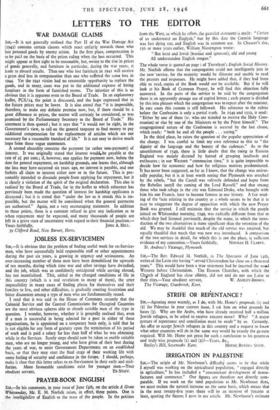JOBLESS EX-SERVICEMEN •
SIR,-It is obvious that the problem of finding useful work for ex-Service- men, who have successfully held responsible staff or other appointments during the past six years, is growing in urgency and seriousness. An ever-increasing number of these men have been demobilised for upwards of ten months, during which time war and other Savings have dwindled, and the job, which was so confidently anticipated while serving abroad, has not materialised. ThiS, added to the changed conditions of life in this country (which is a real revelation to many of them), the utter impossibility in many cases of finding places for themselves and their families to live, and other difficulties, is gradually creating frustration and bitter discontent among a type of men who are fundamentally sound.
I read that it was said in the House of Commons recently that the Colonial Service and the Control Commissions for Occupied Countries are the most obvious spheres able to absorb suitable men of the type in question. I wonder, however, whether it is generally realised that, even if a man is successful in being selected for a post in either of these organisations, he is appointed on a temporary basis only, is told that he is not eligible for any form of gratuity upon the termination of his period of work and is paid a salary far less than half of what he was obtaining while in the Services. Surely steps should now betaken to enable suitable men, who are no longer young, and who have given of their best during the years of war, to enter Government Departments on an established basis, so that they may start the final stage of their working life with some feeling of security and confidence in the future. I should, perhaps, make it clear that this letter refers to es-Servicemen In their early and mid- forties. More favourable conditions exist for younger men.—Your






























 Previous page
Previous page